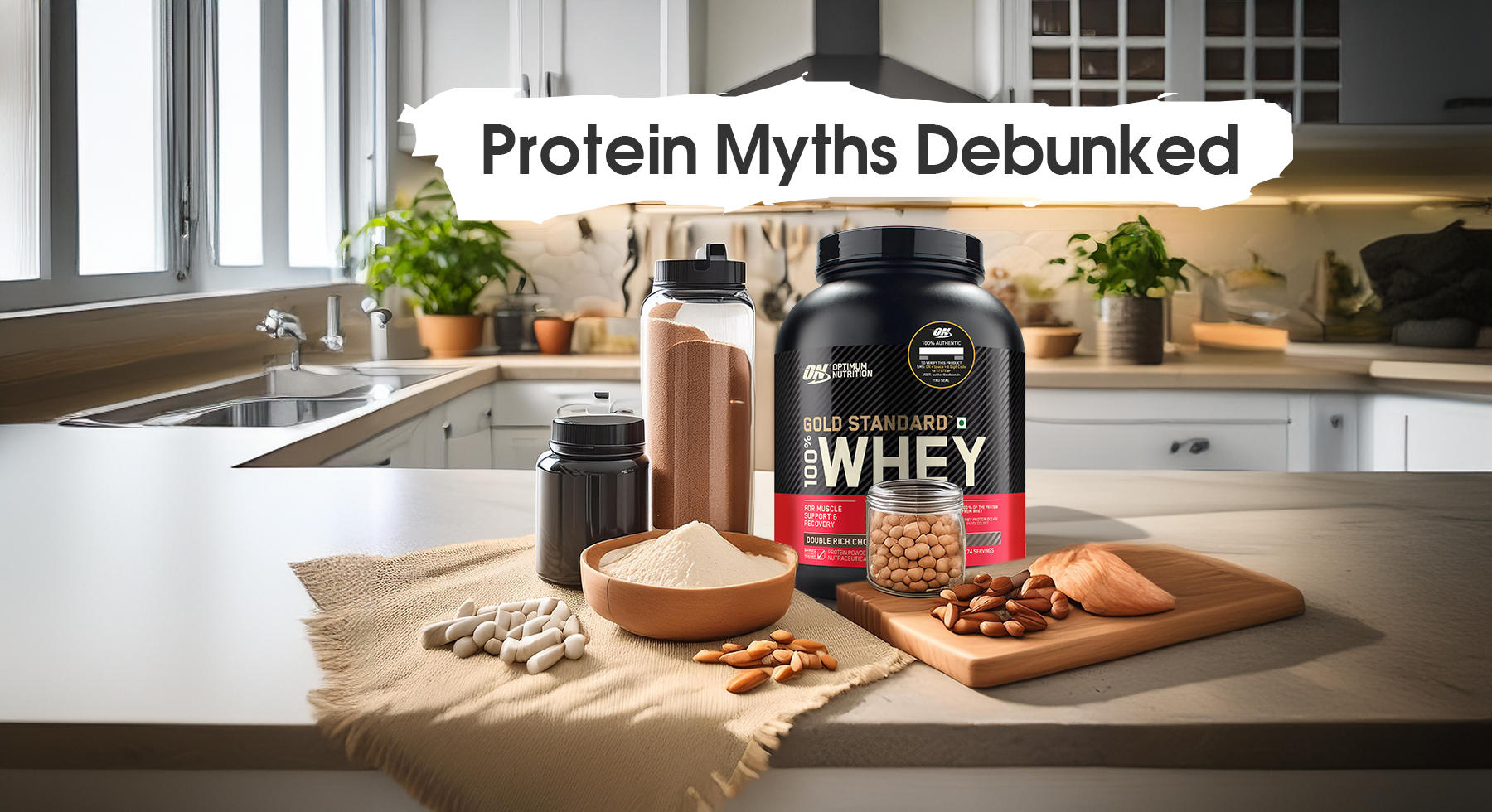
The top protein myths debunked: Simplifying protein and protein supplements
(protein supplements-protein facts-protein myths)
In today's fast-paced lifestyle, the need to consume adequate protein has surged. Protein is essential for muscle repair and growth, as well as for maintaining overall health and energy levels. Including protein-rich foods in your diet is vital to meeting your body's requirements in a fast-paced environment. Despite increased knowledge and awareness, protein myths continue to circulate. In this article, let's debunk some common protein myths and provide accurate information to help you make informed decisions about your diet. Keep in mind that not all protein sources are the same; therefore, understanding the facts is crucial before altering your diet.
Table of Contents :
- Myth 01 : Protein is only for men
- Myth 02 : Protein is only for gym-goers.
- Myth 03 : The human body can only digest up to 30 g of protein at a time, and any protein consumed above 30 g is wasted.
- Myth 04 : You need to have protein as soon as you finish your workout.
- Myth 05 : Protein powders are steroids.
- Take Home Message
Debunking Protein Myths with Facts
Myth 01 : Protein is only for men.
Fact :Though men and women have different body types and needs, the importance of protein for an individual, regardless of gender, remains the same. Yes, it's true that men require slightly higher amounts of protein due to their higher requirement for muscle mass. However, women also need adequate protein to support muscle growth, repair, and overall health. Both men and women should include protein-rich foods such as lean meat, eggs, dairy products, and legumes in their diets to fulfill their nutritional requirements.
Myth 02 : Protein is only for gym-goers.
Fact :Many still believe that consuming protein is only essential if one hits the gym on a regular basis. While it is true that they require that extra shot of protein for muscle repair and growth, that does not imply that protein is only beneficial for those who work out. Protein is vital for everyone, irrespective of their level of physical activity, as it is involved in essential bodily functions beyond muscle development. It's important for overall health and well-being to include adequate protein in your diet, regardless of whether you hit the gym or not.
Myth 03 : The human body can only digest up to 30 g of protein at a time, and any protein consumed above 30 g is wasted.
Fact :There is no such limit, in fact your body is well capable of digesting higher amounts of proteins at any meal or single occasion. However, for muscle protein synthesis general recommendation for athletes is to consume 20 – 40 gm of protein at any given instance.
Myth 04 : You need to have protein as soon as you finish your workout.
Fact :You must have heard about the magical "Anabolic Window or Window of Opportunity," where you need to have protein within 30–60 minutes after your workout. But do you really think if you consume protein after 60 minutes, your body won't digest and absorb it and support the muscle protein synthesis process just as effectively? Absolutely not. Our body is designed in such a way that it does not require a spell-work for it to function. There is scientific evidence to back up this theory. If you balance out your protein thoroughly throughout the day and are mindful of consuming your pre-workout meal, it's not a compulsion to consume your post-workout meal within an hour. The timing of the preworkout meal determines the immediacy of postexercise protein ingestion. The closer the meal to the training session, the less requirement for rapid post workout protein intake; if exercising in a fasting state, prompt refueling with high-quality protein is important.
Myth 05 : Protein powders are steroids.
Fact :Protein powder is made from milk (whey protein) and plant based products (plant protein) , which we easily consume in our daily lives. Protein powders are simply a convenient way to increase protein intake, especially for those who have higher protein requirements or struggle to meet their needs through whole foods alone. They are not steroids and do not have the same effects on the body. They simply go through various filtration processes to eradicate any contaminated substances and improve their quality. Additional flavors or ingredients are added for taste and extra benefits. The FDA (Food and Drug Administration) regulates all supplements. If you are still in doubt about whether the protein you purchase is safe or not, check for the Informed Choice or Informed Sports certification. These certifications ensure that the product has been tested for banned substances. It is important to consult with a healthcare professional or nutritionist before starting any new supplement regimen.
Take home message
Protein and protein supplements have often been viewed with suspicion, leading to the perpetuation of myths about their consumption and associated health risks. There have been controversies about protein and its risks, but it is completely unfair to stick to one source of evidence. With the help of studies and research, protein "myths" have been debunked. Considering a range of sources and perspectives is crucial for assessing the impact of protein on health. Additionally, consulting with a healthcare professional can provide personalized guidance on incorporating protein into a balanced diet.

